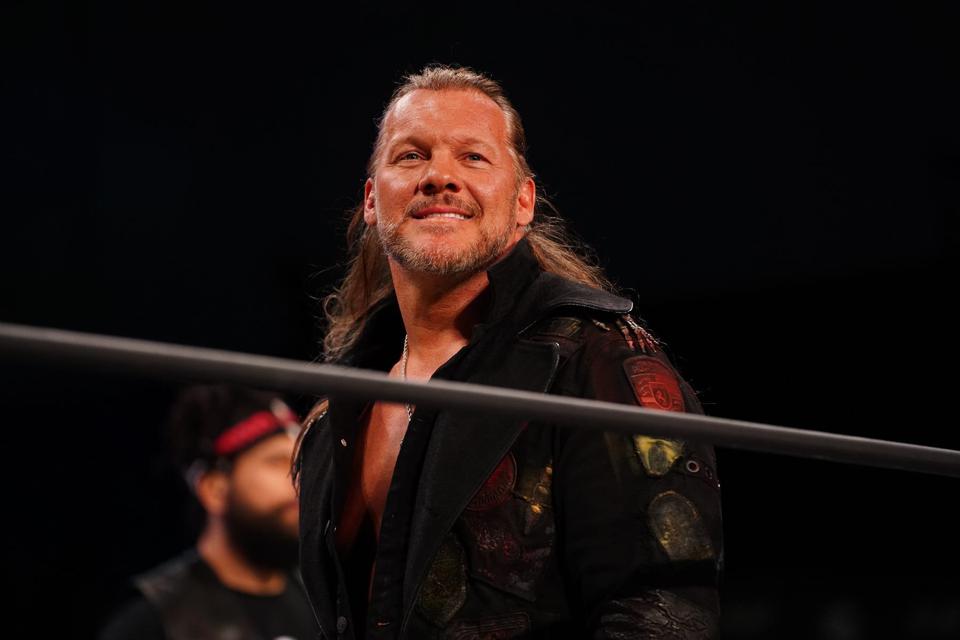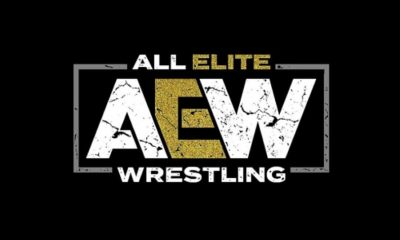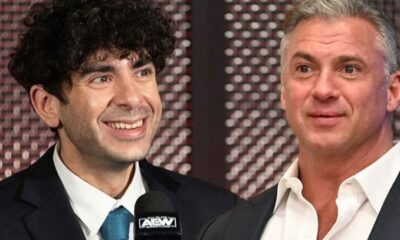
Top AEW Star Chris Jericho recently appeared on Busted Open Radio, where he talked about his new book and how he kept a record as well as listed down each and every match of his illustrious pro wrestling career.
This is what Chris Jericho said:
“I was!” “You can see on the inside of the book, that’s the actual, that’s the real, legit, first page. You can even see the binder clips. We were able to kind of recreate that when you open the book up. I did carry this binder with me around the world. And that’s the crazy thing. I started thinking ‘what if I lose this? What if there’s a fire or a flood? All this information will be gone.’ Now keep this in mind. In about 2010 or so, Cagematch.com started keeping track of all the matches of everybody. So now it’s a lot easier, but what I have here is the first seven or eight years. WCW you can probably even find those matches. But the matches I had in Mexico, Japan, Europe, even ECW in the early 90’s. You can’t find that stuff.”
“This is a whole history book of even the early 90’s in Mexico. I mean, just going by match #186, July 25, 1993, (me) Oro and Transformer vs. Villano IV, V and Masakre in Mexico City. All of these guys, it’s like ‘who the hell are all these guys?’ You can go through and find all this information. Some of them are huge stars, some of them are not. But you can just see how the business was back then when you were doing stuff overseas, basically on your own. In Mexico City, all those guys are Spanish guys, and then there’s me!”
Chris Jericho then talked about his paydays in pro wrestling, including the first biggest payday he’s had, which is a match he worked when he was in Monterrey, Mexico.
This is what Chris Jericho said:
“Well obviously zero appears quite a bit in here.” “My first payoff was $30. $50 was kind of the average back in those days, and sadly it still is kind of the average these days. $50 minimum is what you’ll get. If you look at my first tour of FMW, October 16, 1991, six man with Lance Storm and Mark Starr vs. Sambo Asaka, Tarzan Goto and Masashi Honda in Nagasaki, Japan. My pay off for that was $160. Because whatever I was making for the week, I took that and divided it by how many matches I had, so that was $160. So it kind of goes through all of those different things. Like I said you still see a lot of zeros. But when I went to the weekly pay, then you would divide. And when I got to WCW, when I’m making a guaranteed amount of money every year, I kind of dropped the payoffs there because it’s going to be the same. If you’re making $1500 a week and you’re working five matches a week, well it’s $300 every time. But the early days it is really funny to see.”
“My first big pay off, and I was talking to Norman Smiley about this, was when I was working Monterrey, Mexico. Now Monterrey was kind of an offshoot of Mexico City (CMLL), which was, let’s say AEW or WWE. Monterrey would be Ring of Honor or ECW. So I kind of started out there. And what happened was there supposed to be a championship match. Black Magic, who was Norman Smiley, versus Vampiro, who was the challenger at the time. Vampiro hurt his leg so he couldn’t do the match. I was kind of the top foreign talent in the Monterrey territory so they put me in Vampiro’s place to wrestle for the Mexico City Heavyweight Championship, like the world championship. And that was December 6, 1992. So I lost to Black Magic, obviously, but because it was a championship main event they paid me $500. And back in those days, if you had a championship match, you’d get double your pay. So I literally got paid $1000 to have this championship match in the bullring against Norman Smiley, I gave it four stars. But that was the first big payoff I ever had. A thousand bucks? For one match? I couldn’t believe it. And that’s the match that ended up getting me hired to Mexico City, because the word got around about this kid. To his credit, Norman Smiley put me over when he didn’t have to. He didn’t even know me, and he made me look like a million bucks as the challenger. And I got a big pay off and I got a good job as a result.”
Chris Jericho then talked about having all the information of his matches put into a computer, but he still has his binder, which is the physical copy of the information and having it turn into a book.
This is what Chris Jericho said:
“The book is now right behind me in this drawer here.” “But it’s actually pretty funny. Alex Marvez, we actually did a Talk is Jericho on this with Alex Marvez and Peter Fornatale, who’s a New York guy who’s worked with me on all my books. And I gave it to Alex and he basically said that. He was so nervous, cause Alex is just the sweetest guy, but he was literally just terrified that something was going to happen to this book. I asked ‘you want me to FedEx it?’ He was like ‘no. Just give it to me in my hands and I will hold it with me on the plane or’ he drove or whatever it was. It was during the pandemic.”
“He took it and I think he and his wife actually, from what I understand, hand delivered the information into the computer. And once it was in, it was in for good. But like I said, this was twenty eight, twenty nine years of having this book. Anything could’ve happened. The fact that I never lost it or it was never stolen. If it was gone, you cannot find this information anywhere. That’s the beauty of this book. This would be like if Bret (Hart) did this, or Shawn (Michaels) did this, or Flair did this. You can’t go look up matches from 1986 like you can matches from 2016. Every match is on there now, but these ones are not. So it was kind of a moment of like ‘did you get the book?’ ‘Yes.’ ‘Did you transfer it to digital?’ ‘Yes.’ Finally we can relax.”

















